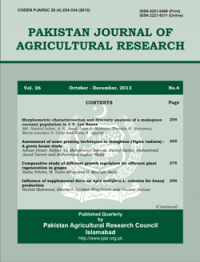Assessment of Formulated Phosphorus Enriched Compost on Rice Followed Wheat Crop Yields
Assessment of Formulated Phosphorus Enriched Compost on Rice Followed Wheat Crop Yields
Matiullah Khan1*, Motsim Billah2, Shoaib Ahmad1, Raza Ullah Khan1 and Muhammad Sarwar1
ABSTRACT
Field experiments were conducted for two seasons to investigate the direct and residual effect of phosphorus enriched compost (PEC) prepared by composting poultry litter (PL) with rock phosphate (RP) and inoculating with effective microorganisms (EM) on the wheat during 2010-11. Both experiments were conducted consecutively, in the same lay out of randomized complete block design with three repeats. Various doses of PEC (6, 4, 2 Mg ha-1) were compared with simple poultry-litter compost (PLC) as 8 Mg ha-1, single super phosphate (SSP) fertilizer as 100 kg P2O5 ha-1 and control. The results showed that PEC at 6 Mg ha-1gave 14.7% and 7.7% increased paddy yield and 14.7% and 11.9%-increased total dry matter yield over PLC at 8 Mg ha-1 and SSP, respectively. The highest soil post-harvest extractable P content of 5.42 mg kg-1and rice-plant P uptake (17.50 kg ha-1) were also recorded in the treatment PECat 6 Mg ha-1 as compared to other treatments. The residual effects of PEC applied at the rate of 6 Mg ha-was superior by producing 36.2%, 14.2% and 7.0%increased grain yields over those of control, PLC and SSP, respectively. The post-harvest soil extractable P value and plant P uptake were significantly higher in the treatment where PEC was applied to the previous crop at 6 Mg ha-1 over rest of the treatments. It was concluded that PEC has the potential to improve yield of two consecutive crop i.e. rice and wheat yields when applied at 6 Mg ha-1.
To share on other social networks, click on any share button. What are these?






